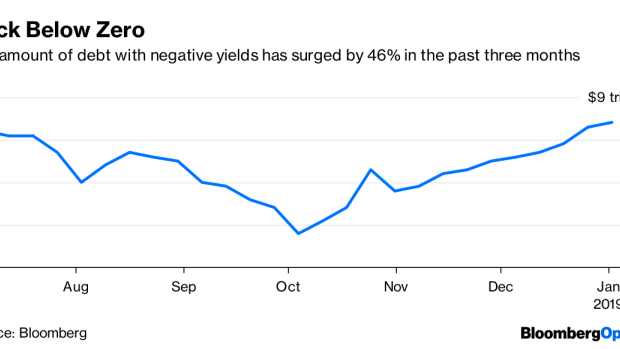Jan 4, 2019
The Widowmaker Trade for Hedge Funds Strikes Again
, Bloomberg News

(Bloomberg Opinion) -- The threat of a synchronized global economic slowdown has erased trillions of dollars of value from global stock markets in recent months. As they flee to the perceived safety of government bonds, investors are driving yields in many corners of the fixed income market back below zero. Once again, shorting government debt is proving to be a widowmaking trade.
After dropping to a three-year low of $5.73 trillion in October, the amount of negative-yielding debt has climbed by more than 46 percent in the past three months to reach $8.4 trillion. That’s quite an achievement given that the European Central Bank halted its bond purchases at the end of last year.
The drop in yields that’s put 10-year German borrowing costs back within sniffing distance of the so-called zero bound has confounded the predictions of some of the biggest names in fund management. In April 2015, bond-market legend Bill Gross described betting against the euro zone benchmark as “the short of a lifetime” — and yet here we are with the bund yield back to where it was when he made that call, at about 0.18 percent.
In September 2017, Hugh Hendry shuttered his Eclectica hedge fund after 15 years following a wrong-way bet on the short end of the German bond market — “the most distorted asset class in the world,” as he described it. Again, the current two-year yield of -0.6 percent is about where it was when Hendry threw in the towel.
In Japan, the country responsible for the bulk of the world’s negative-yielding debt, the 10-year yield marked the end of last year by dipping below zero for the first time since September 2017. And in the U.S. Treasury market, the 3.22 percent level for the long bond — identified by DoubleLine Capital Chief Investment Officer Jeffrey Gundlach in April 2018 as “one last pivot point” before the bull market would end — turned out to be a false indicator of the path the 30-year yield would take.
The shift in bond yields isn’t solely the result of money fleeing the equity markets. It also reflects renewed pessimism about the world economy’s ability to maintain momentum in the coming year — witness Apple Inc.’s warning about the effect of China’s slowdown on sales of its gadgets — which in turn is damping expectations for inflation.
Hedge funds collectively lost more than 7 percent last year, the industry’s worst showing since 2011, according to data compiled by Hedge Fund Research. For those portfolio managers that have been betting on government debt yields continuing to rise, the violence of this recent downward shift could prove painful for their returns.
To contact the author of this story: Mark Gilbert at magilbert@bloomberg.net
To contact the editor responsible for this story: Edward Evans at eevans3@bloomberg.net
This column does not necessarily reflect the opinion of the editorial board or Bloomberg LP and its owners.
Mark Gilbert is a Bloomberg Opinion columnist covering asset management. He previously was the London bureau chief for Bloomberg News. He is also the author of "Complicit: How Greed and Collusion Made the Credit Crisis Unstoppable."
©2019 Bloomberg L.P.